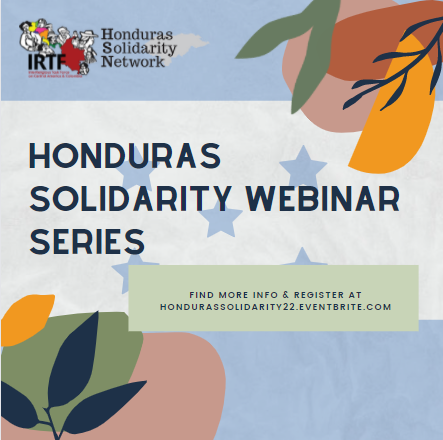Join Honduras Solidarity Network and IRTF in a four-part webinar series from March 15 – April 5 to learn from Honduran activists about the effects of US imperialism on people of the Global South.
From the late 1800’s, the United States has been destabilizing countries in Central America, including Honduras, through political, corporate, and military intervention. As recent as in 2009, the U.S. stood by while the Honduran military violently ousted President Manuel Zelaya. Systemic inequality and the ensuing violence – including the criminalization and assassinations of hundreds of Honduran activists– has led to a significant increase in Honduran migration toward the U.S. over the past decade.
With the victory of Xiomara Castro, the first woman head of state in Honduras, in the elections of November 28 2021, the country experienced a historic step forward for the popular resistance that coalesced after the 2009 coup. Still, there are many uphill battles in the struggle for justice and dignity for the people of Honduras. The previous administrations since the 2009 coup betrayed their own people by selling the country’s land, water, and minerals to foreign investors; brutalizing of activists by the police and military with US-supplied funding and training; and installing maximum-security prisons designed after those existing in the US.
In this four-part webinar series, we will be looking at how corruption, land dispossession, environmental degradation, and systemic human rights abuses are the consequences of neoliberal (global free-market capitalist) policies and the legacy of U.S. imperialism. We at Honduras Solidarity Network and the InterReligious Task Force on Central America and Colombia invite you to join this series to gain a deeper understanding around these issues, as well as what can be done by people living in the Global North to show solidarity.
For detailed descriptions of each webinar, follow this link.
March 15, 8 PM (Eastern): Where are we now?
The elections of November 28, 2021, became a historic event for Honduras. We see Xiomara Castro’s electoral victory as another step in the popular resistance that preceded the 2009 coup. This victory resulted from the work of a coalition that spanned the political spectrum in Honduras to oppose the re-election of newly-displaced dictator, Juan Orlando Hernandez. It is also because of the countless sacrifices of criminalized and murdered activists that the people of Honduras can continue to resist the harmful impacts of the U.S. and Canada-backed neoliberal model (global free-market capitalist).
The Honduran people are working to build a new country with justice and dignity. Join this webinar to gain a deeper understanding of the current political landscape in Honduras after the election of President Xiomara Castro, the new foreign policy interests of the U.S. and Canada towards Honduras, and what it means now to build solidarity with the people of Honduras. U.S.-Honduran solidarity.




